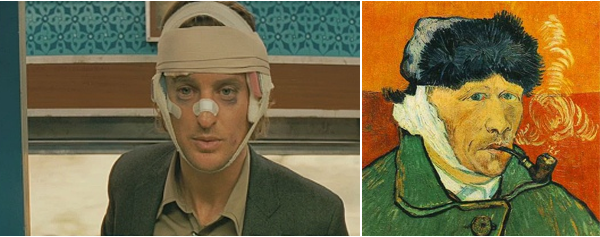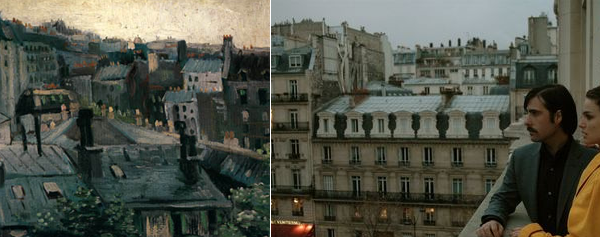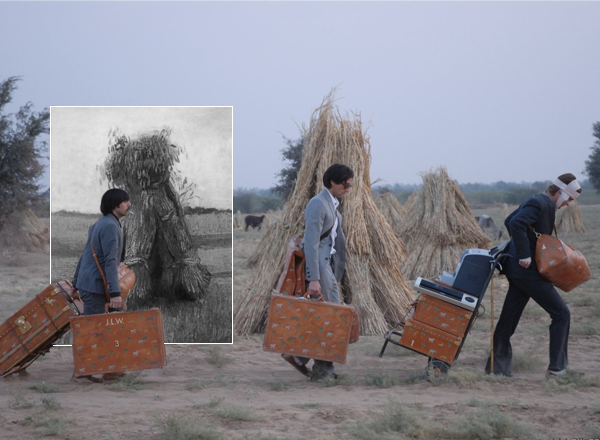Film
A film I never saw

On August 26, 2007, Owen Wilson was taken to a hospital in Santa Monica, California, after slashing his wrists in a suicide attempt. A friend tells People magazine “he almost did not make it”; that Wilson’s near fatality was reduced to a cliché in a glossy may be the reason why he questioned his life, or we might question ours. Wilson had also recently broken up with Kate Hudson, so she may consider herself flattered. The truth is we will never know what went on in the mind of a made man. The money and success just not enough. Months later, The Darjeeling Limited (2007) was released, in which Wilson — his character having just suffered a horrible motorcycle accident — is seen ineffectively wearing a bunch of gauze. He and his brothers went to find their father; not his corpse, but emotional legacy. Owen’s real life brother Luke Wilson has his own suicide scene in The Royal Tennenbaums, his wrists streaming blood over curly locks of cut hair in Starry Night blue. On December 23, 1889, Vincent Van Gogh cuts off his ear (or merely the lobe, he claims) in a brothel, and hands it to a prostitute for safe keeping; Gauguin is to find him later on that night in his bed covered in blood. Some art historians propose that it was actually Gauguin who did it during a heated argument; others say it was Van Gogh’s clingy response to Theo (his brother and sole patron) getting engaged. To others, simply a bad night with a hooker. The truth is we will never know what went on in the mind of a mad man. In another similar self-portrait painted presumably that week, or even day, for he wears the same outfit, a Japanese print on the wall behind him shows two mothers and their children situated immediately next to his good ear, whispering over waves.

In Hotel Chevalier (2007), a 13 min prologue to The Darjeeling Limited, after a couple make love in the titular hotel, the now relieved man — perhaps simply in need of something to do, or per the parenthetical directions in the script — shows off the clustery view from his balcony, which may be an extension of our director showing off his taste to us. Wes Anderson’s style is style itself: self-conscious, perhaps a little self-satisfied in its ingratiating measure towards the very audience for which the films are made. Watching a Wes Anderson film is like standing in a circle at a party automatically laughing at anything resembling a joke, and suddenly being stricken with the fearful question: Am I like this? I found myself giggling, though, to Jason Schwartzman holed up in a hotel room grimly administering the logistics of a booty-call, having been in similarly heart-pattering and depleting situations before. He is unhappy; she probably high. He, an explicit mustache; she, oblique bruises. First world problems have always been so, however more austere in the century or two preceding ours. Of Van Gogh’s “Paris rooftops” (c. 1886), we see a painter still sulky under the monochrome grey-blues, not yet released into the rays of light by which he would be forever stricken. The dutch painter went to Paris convinced of its light, only to slather titanium white mixed with Naples yellow — itself named after an Italian city promising light. That the quest for artistic “material” in a city or a lover keeps the tourism and lingerie industry afloat, respectively, is free-market’s loyal bow to us. We never see them make love, only the kind distance between them afterwards.

One of my friends, a woman painter in her mid-forties living in Moss Landing, California, carries a sad look around her. She once made me eggs in a cast-iron skillet with a tablespoon of butter, which exuded happiness, or at least lubed it, though the chef was still sad. I looked out the window and saw nothing really, and wondered if that was also the view from outside. Everyday, her cat elsewhere, she pushes goop around on a canvas hoping to see another person inside. Suicide’s stylization is the advertisement of ennui — a fancy French word for not having any real problems. Chronic depression is child you have. It is born and must be fed. It learns the language you speak, gathers your mannerisms. It grows into an adult, with fully realized neurons, and cries on your death bed. Life is a kid we never wanted.
She (I was to be told this story by a mutual friend, upon my inquiry) went to India when she was youngish, in her early twenties, when the world still seems like an open autobiography, and evidently “came back sorta fucked,” though those are my words. I asked what could be so fucked about a Siddhartha or Eat, Pray, Love-ish experience, and she, the story-teller, said “no, it wasn’t that; she just got really sick.” Like she almost died, though the near death experience didn’t thrust her towards life. It simply lingered there, the white light of a dentist’s office. I felt bad. I still do. I picture a bunch of unsatisfied people in this country, this grand first world country with clean water and dirty Gods, going to a country with dirty water and clean Gods, to negotiate happiness, to bargain for it, to try to find “something” in a world whose atomic constituent was built, literally, upon nothing. And we wonder why we’re empty. Van Gogh ended up shooting himself in the belly in a wheat field. Some say it was to prolong his death; others say he was simply too scared to shoot himself in the head. He tried to be a Minister, but no one listened.
I never actually saw The Darjeeling Limited, which can be both a concession and assertion. The Friday night excitement in line for a movie always seemed sad to me, like I would always picture each person in line in bed later on that night, having seen the movie, and how those flashes of light so seemingly real and so loud were ultimately flattened by the black roll of credits at the end. People go back to their apartments and get into not-so-cleverly-written arguments. There’s always an old woman, alone in the back, who stays for the entire credits, as if looking for someone she knows. When the theater is finally black, and boys with brooms come in to clean up the laughter-spilt popcorn, she embarrassingly gets up and enters her own life again. The real one with nerve endings and a twisted heart. The first scene usually involves me. On the sidewalk, hugging myself in the cold.

thanks for this
this is gorgeous, jc.
i recently re-watched hotel chevy and like, damn, natalie portman’s butt. couldn’t help thinking ‘wes anderson’s tailored pitch-a-tent’
‘…ennui — a fancy French word for not having any real problems.’ lol fully expect deadgod to weigh in on this one
Really, really good.
And I mean that in a very homoerotic way. The antithesis of “no homo”.
Jimmy Chen’s writing is like Vishnu dreaming, creating a world of tangents with connections, selection of attentions and attachements, always seeing through the illusion of reality to the underlying suffering we must face. Then the reader wakes up and dreams their own dreams. I love reading your stuff, Jimmy. I’ve been watching Joseph Campbell on PBS.
oh my. Definitely going to talk to that old lady next time.
if i lived in the 3rd world i wonder if i would take offense at the phrase ‘first world problems.’ don’t i get to have bad breakups, heartache, and ennui?
i stay longer than the old woman, who usually smells like pearl onions and hard salami, because i am a competitive-endurance freak. also, “it’s part of the experience,” etc.
Everytime I think about not reading HTMLGiant, Jimmy Chen posts something awesome.
Your final paragraph reminds me of the ending of The Purple Rose of Cairo, which kind of makes that film for me.
It was hard to watch that scene in The Darjeeling Ltd when Wilson’s character talks about how he got the injuries. I remember I came out of the cinema with my boyfriend, and the night seemed full of stars – it was just after Christmas, I think. We went home to the flat we were sharing at my cousins, to find him – unexpectedly, since he was supposed to be staying at his mums – enraged at us leaving all the Christmas leftovers and dishes out. It cracked the dreamy mood. We moved out soon after.
Did you just go Woody Allen? I love you.
The scene where he takes off the bandages and show his scars with his brothers behind him is incredible. It’s a great metaphor for the relationship he is trying to hold together with his brothers, how he puts on bandages to heal the scars from the unnamed accident which was their scarred childhood, having a lot to deal with parents who selfishly conceived children out of personal desire, and then abandoned them, and keep abandoning them until death. It’s really an incredible, hyper-real movie about how fucked American families are, like all Anderson’s movies. And it’s a tremendous and wonderful and funny and beautiful fucked up. I love it.
by the way, this article was amazing. I haven’t commented on anything or regularly read the giant anymore, but this was great.
This is beautiful.
I haven’t been here in a week, so I scrolled through to find something by Jimmy Chen. He makes this site relevant. (to me)
I wanna jump on the backhanded compliment of “you’re the only reason to visit this site” bandwagon here, I stopped reading htmlgiant about a year and a half ago; they seemed to get an influx of new contributors who just whined a lot. But I’m deciding to suck it up and come crawling back, and your entries are the primary reason. I love this and I love you, Jimmy Chen.